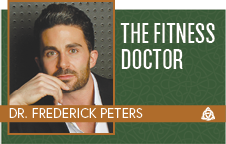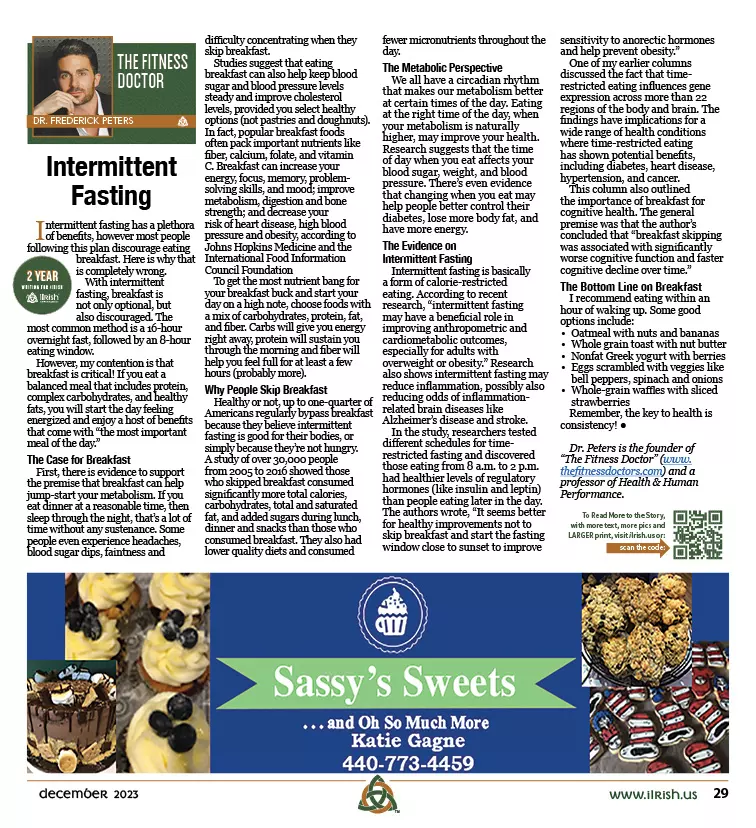The Fitness Doctor: Intermittent Fasting and Why You Are Doing It Incorrectly
- John O'Brien
- December 2, 2023
- Edited 6 months ago
Table of Contents

By Dr. Frederick Peters
Intermittent fasting has a plethora of benefits, however most people following this plan discourage eating breakfast. Here is why that is completely wrong.
With intermittent fasting, breakfast is not only optional, but also discouraged. The most common method is a 16-hour overnight fast, followed by an 8-hour eating window.
However, my contention is that breakfast is critical! If you eat a balanced meal that includes protein, complex carbohydrates, and healthy fats, you will start the day feeling energized and enjoy a host of benefits that come with “the most important meal of the day.”
The Case for Breakfast
First, there is evidence to support the premise that breakfast can help jump-start your metabolism. If you eat dinner at a reasonable time, then sleep through the night, that’s a lot of time without any sustenance. Some people even experience headaches, blood sugar dips, faintness and difficulty concentrating when they skip breakfast.
Studies suggest that eating breakfast can also help keep blood sugar and blood pressure levels steady and improve cholesterol levels, provided you select healthy options (not pastries and doughnuts). In fact, popular breakfast foods often pack important nutrients like fiber, calcium, folate, and vitamin C. Breakfast can increase your energy, focus, memory, problem-solving skills, and mood; improve metabolism, digestion and bone strength; and decrease your risk of heart disease, high blood pressure and obesity, according to Johns Hopkins Medicine and the International Food Information Council Foundation
To get the most nutrient bang for your breakfast buck and start your day on a high note, choose foods with a mix of carbohydrates, protein, fat, and fiber. Carbs will give you energy right away, protein will sustain you through the morning and fiber will help you feel full for at least a few hours (probably more).

Why People Skip Breakfast
Healthy or not, up to one-quarter of Americans regularly bypass breakfast because they believe intermittent fasting is good for their bodies, or simply because they’re not hungry. A study of over 30,000 people from 2005 to 2016 showed those who skipped breakfast consumed significantly more total calories, carbohydrates, total and saturated fat, and added sugars during lunch, dinner and snacks than those who consumed breakfast. They also had lower quality diets and consumed fewer micronutrients throughout the day.
The Metabolic Perspective
We all have a circadian rhythm that makes our metabolism better at certain times of the day. Eating at the right time of the day, when your metabolism is naturally higher, may improve your health. Research suggests that the time of day when you eat affects your blood sugar, weight, and blood pressure. There’s even evidence that changing when you eat may help people better control their diabetes, lose more body fat, and have more energy.
The Evidence on Intermittent Fasting
Intermittent fasting is basically a form of calorie-restricted eating. According to recent research, “intermittent fasting may have a beneficial role in improving anthropometric and cardiometabolic outcomes, especially for adults with overweight or obesity.” Research also shows intermittent fasting may reduce inflammation, possibly also reducing odds of inflammation-related brain diseases like Alzheimer’s disease and stroke.
In the study, researchers tested different schedules for time-restricted fasting and discovered those eating from 8 a.m. to 2 p.m. had healthier levels of regulatory hormones (like insulin and leptin) than people eating later in the day. The authors wrote, “It seems better for healthy improvements not to skip breakfast and start the fasting window close to sunset to improve sensitivity to anorectic hormones and help prevent obesity.”
One of my earlier columns discussed the fact that time-restricted eating influences gene expression across more than 22 regions of the body and brain. The findings have implications for a wide range of health conditions where time-restricted eating has shown potential benefits, including diabetes, heart disease, hypertension, and cancer.
This column also outlined the importance of breakfast for cognitive health. The general premise was that the author’s concluded that “breakfast skipping was associated with significantly worse cognitive function and faster cognitive decline over time.”
The Bottom Line on Breakfast
I recommend eating within an hour of waking up. Some good options include:
- Oatmeal with nuts and bananas
- Whole grain toast with nut butter
- Nonfat Greek yogurt with berries
- Eggs scrambled with veggies like bell peppers, spinach and onions
- Whole-grain waffles with sliced strawberries
Remember, the key to health is consistency!
Find this and Dr. Peter’s other Fitness Doctor columns and others from this month’s issue here.





